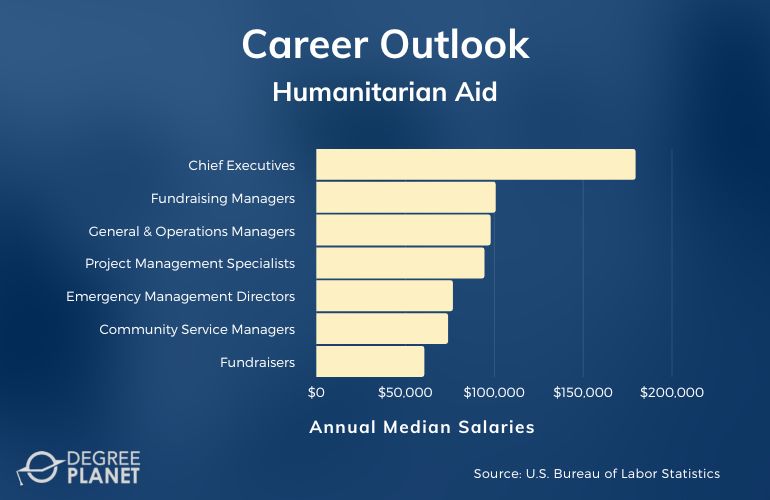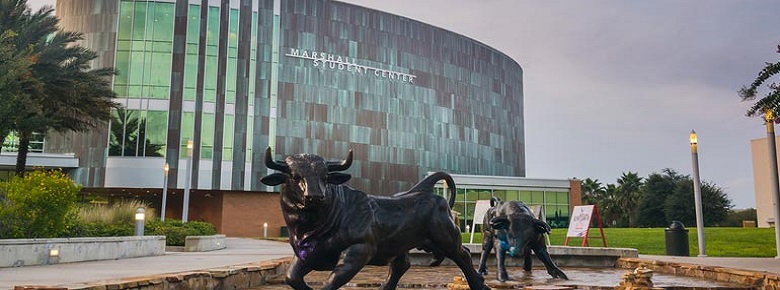If you’re passionate about helping others and making a difference in the world, you might consider earning a masters in humanitarian aid.

You may also find this degree helpful if you have interests in medical care, children’s aid, food security, and disaster relief.
Editorial Listing ShortCode:
There’s a variety of career paths in this area of study. Aid organizations need professionals with a wide range of expertise, and humanitarian graduate studies could help you develop the necessary skills to assist or lead aid efforts.
Online Masters in Humanitarian Aid Programs

A masters in humanitarian studies is an interdisciplinary program that’s focused on the practice and theory of humanitarian relief.
This type of masters degree program can help prepare you to make contributions to various humanitarian operations. Course topics that you may study during an online humanitarian master’s degree include:
- Global civil society
- Ethics and international affairs
- Developing countries in the global economy
- Peacebuilding and developing
- Critical analysis for global affairs
- Network and capacities for peace
- Global public health
- Corruption and anti-corruption
- Private sector partnership
You can also dive into contemporary humanitarian issues, such as human rights in conflict, forced migration, and urban disasters. Plus, a masters program in this field can help you learn about policymaking and develop project management skills.
Editorial Listing ShortCode:
Humanitarian project managers are often responsible for managing and evaluating certain projects, developing financial planning, conducting risk analysis, and capacity building. A masters in humanitarian aid could also lead to a variety of career paths. Some professionals in the field work as:
- Program directors
- Crisis response leads
- Advocacy and communications consultants
- Humanitarian affairs officers
- Grant writers
- Social workers
- Emergency management directors
Humanitarian aid organizations also require workers with various expertise, such as finance, strategic communications, policy coordination, logistics, and advocacy. Healthcare workers are also valuable team members in aid and relief work.
Humanitarian Aid Careers & Salaries

With an online humanitarian master’s degree, you may find rewarding work in various sectors and industries. For example, a large number of graduates of online human services degree programs work with non-governmental organizations (NGOs).
Graduates can also work in other humanitarian-related sectors, such as nonprofit organizations and educational institutions. According to the Bureau of Labor Statistics, here are the median salaries of some potential career paths related to the humanitarian aid sector.
| Careers | Annual Median Salaries |
| Chief Executives | $179,520 |
| Fundraising Managers | $100,810 |
| General and Operations Managers | $97,970 |
| Project Management Specialists | $94,500 |
| Emergency Management Directors | $76,730 |
| Social and Community Service Managers | $74,000 |
| Fundraisers | $60,660 |
| Health Education Specialists | $60,600 |
| Child, Family, and School Social Workers | $49,150 |
| Community Health Workers | $46,590 |
As you can see, there are many different career paths in the humanitarian aid sector. Salaries can vary widely depending on the specific position, but there are opportunities for both entry-level and more experienced professionals within this field.
Editorial Listing ShortCode:
There are also opportunities for business, finance, and human resources professionals in this field, as these workers help keep humanitarian aid organizations up and running.
Humanitarian Aid Master’s Curriculum & Courses

Your humanitarian masters degree program may have courses similar to the ones listed below:
- Developing Countries in the Global Economy: This course examines the challenges developing nations face in today’s interdependent world, along with the proposed approaches to tackle them.
- Ethics in International Affairs: This course explores one primary question in international relations: Should moral considerations play a role in the conduct of foreign affairs?
- Political Economy of Development: In this course, you’ll examine various problems related to economic growth and development from a Marxist and classical perspective.
- Monitoring and Evaluation for Global Affairs: In this course, you are provided with case studies of organizations in need of monitoring and evaluation programs.
- Democratic Transitions: Setbacks and Successes: This course examines the efforts to build democracy and the challenges to that work in specific nations in Asia, the Middle East, Africa, and Latin America.
- International Criminal Law and Tribunals (or International Justice): You’ll take a look at international institutions founded to tackle and prosecute genocide, humanitarian crimes, and war crimes.
- Corruption and Anti-Corruption: This course explores the impacts of corruption, and it’s strongly policy oriented.
- Children’s Rights (International Norms and Standards): This course will examine international norms that make up the rights of children from the CRC (Convention on the Rights of the Child).
- Entrepreneurship in a Globalized World: In this course, you’ll learn to convert problems into opportunities through a process that aids you in honing your execution and strategy.
- Issues in Humanitarian Assistance and Intervention: You’ll explore how international agencies and non-governmental organizations wrestle with the complex problems that may arise during emergency situations.
These courses may help prepare you for careers with organizations involved with aid and advocacy. Your specific coursework will depend on your chosen school and program.
Admissions Requirements

Admission requirements for masters in humanitarian aid programs may be different from school to school, but common criteria include:
- GRE or GMAT scores (only some schools require them)
- Bachelor’s degree from an accredited school
- Official undergrad transcripts
- Statement of intent
- Letters of recommendation
In addition to the requirements listed above, your school may also have an application fee. Most schools have their admissions criteria listed on their websites, but you can also contact a school’s admissions office for more information.
Masters in Humanitarian Degree Programs Accreditation

The regional accreditation process evaluates educational institutions to ensure that they meet certain quality standards.
Enrolling in a school that has been regionally accredited is essential, as it could affect your eligibility to receive financial aid or to apply for a graduate program down the road. Attending a regionally accredited school can also impact the transferability of your credits. In addition, employers often prefer candidates whose education was completed at an accredited school.
Editorial Listing ShortCode:
If you need more information on whether the school you’re applying to is accredited, you can visit the Council for Higher Education Accreditation (CHEA) website.
Financial Aid and Scholarships

There are available resources that could help you fund your humanitarian aid program. You can explore your options to see if you meet the eligibility requirements for federal and state loans or grants, employer training programs, and scholarships.
To see if you qualify for need-based aid from the government, you can submit the Free Application for Federal Student Aid (FAFSA). The federal government also offers additional aid opportunities, such as work study programs. In addition, various public and private organizations give out scholarship opportunities to college students. Your school may award scholarships to qualifying grad students as well.
If you’re currently working, you can also check to see if your employer provides extra funding through employee training programs or tuition reimbursement programs.
What Can You Do with a Masters in Humanitarian Assistance Degree?

Graduate studies in humanitarian aid can help you prepare for a range of opportunities in the field, depending on your interests.
Some humanitarian professionals work as disaster relief workers, case workers, human resources specialists, advocacy consultants, and humanitarian response specialists. Your masters program may help you develop leadership and program management skills as well. Leaders in the field may work as emergency management directors, program directors, or crisis response leads, among other roles.
Humanitarian assistance workers typically work for nonprofit organizations, government agencies, or private companies. They can also work internationally for organizations such as the Red Cross or UNICEF.
How Long Does It Take to Get an Online Masters Degree in Humanitarian Aid?

How long it takes to complete a masters degree in humanitarian aid depends on several factors, including the specific program you choose and whether you attend full-time or part-time.
Most master degree programs can be completed in 1 to 2 years with full-time study. If your program requires 36 credit hours of coursework, you may be able to earn your degree in 1 year if you attend full-time and year-round. If your program requires a thesis, it will often take longer to complete your degree. Part-time enrollment can also extend your overall completion time.
So, if you’re considering an online masters degree in humanitarian aid, it’s helpful to ask about the requirements and expected timeline for completion.
Is a Masters in Humanitarian Action Worth It?

Yes, a masters in humanitarian action is worth it for many students. A degree in this field can lead to a variety of career opportunities in international relief work, domestic social services, or NGOs. A masters program can also help you develop leadership and program management skills.
Editorial Listing ShortCode:
There is expected to be faster than average growth in the humanitarian sector in the coming years. For instance, the Bureau of Labor Statistics projects 12% job growth for community and social service occupations over the next ten years. With an aging population and increasing global conflict, there is likely to be a continued demand for skilled humanitarian workers.
Universities Offering Online Masters in Humanitarian Aid Degreee Program
Methodology: The following school list is in alphabetical order. To be included, a college or university must be regionally accredited and offer degree programs online or in a hybrid format.

A Master of Arts in Social Justice and Human Rights is offered at Arizona State University. Graduates may pursue diverse roles in the discipline, including grants manager, humanitarian aid worker, non-profit agency manager, and governmental organizer. The program requires 11 classes. Each one is 7.5 weeks long. Students can complete their curriculum requirements fully online.
Arizona State University is accredited by the Higher Learning Commission of the North Central Association of Colleges and Schools.

California State University—Maritime Academy offers a Master of Science in Transportation and Engineering Management. Students can choose between concentrations in Engineering, Transportation, and Humanitarian Disaster Management. The online coursework can be accessed around the clock, helping to ensure flexibility for students. On average, most students can complete the 30 required credits in just 20 months.
California State University Maritime Academy is accredited by the Western Association of Schools and Colleges.

Fordham University offers a Master of Arts in International Humanitarian Action. The program aims to prepare students for careers where quick and mindful action are essential. The multidisciplinary curriculum is designed to develop a broad skillset. Courses cover topics like information management, risk reduction, disaster management, and protection of vulnerable populations.
Fordham University is accredited by the Higher Learning Commission.

Johns Hopkins University offers a Master of Applied Science in Humanitarian Health. Courses cover key topics such as disaster preparedness, public health emergencies, and community program development. The curriculum is designed with working professionals in mind. Courses can be taken entirely online, and students can select a full-time or part-time schedule.
Johns Hopkins University is accredited by the Middle States Commission on Higher Education.

Liberty University offers a Master of Arts in Humanitarian Action and Human Rights. The program is often a great fit for students pursuing careers of service in times of crisis. On average, students can complete their 36 required credits in 1.5 years. All courses are held online, and each one is 8 weeks long.
Liberty University is accredited by the Southern Association of Colleges and Schools Commission on Colleges.

The University of New Hampshire offers a Master of Global Conflict and Human Security. Graduates may pursue careers as foreign aid officers, policy analysts, social policy managers, humanitarian aid workers, or risk analysts. The program requires the completion of 30 credit hours of online coursework. Typically, students can complete the program’s requirements in just 12 months.
The University of New Hampshire is accredited by the New England Commission of Higher Education.

The University of San Diego offers a Master’s in Humanitarian Action. The curriculum aims to teach students how to promote ethical policies, use critical thinking skills, and apply humanitarian strategies to a variety of issues. All courses in the 30 credit curriculum are offered online. Most students can complete their studies in just 20 months of full-time attendance.
USD is accredited by the Accrediting Commission for Senior Colleges and Universities of the Western Association of Schools and Colleges.

The University of South Florida offers a Master of Public Health with a concentration in Global Disaster Management—Humanitarian Relief and Homeland Security. This specialty is centered on research, technical skills, and leadership strategies. This program is housed entirely online. It requires a combination of core, concentration, elective, and thesis requirements, for a total of 42 credits.
The University of South Florida is accredited by the Southern Association of Colleges and Schools Commission on Colleges.

The University of Southern California offers a Master of Science in Human Security and Geospatial Intelligence. Upon graduation, students often pursue careers in domestic, humanitarian, government, and military organizations. Students enrolled full-time can typically complete the program’s requirements in 20 months, while part-time students usually finish in 3 years. This program is fully online.
The University of Southern California is accredited by the Western Association of Schools and Colleges, the Senior College, and the University Commission.

The University of Texas—El Paso offers a Master of Defense and Strategic Studies. This master’s may be an excellent next step for individuals working in intelligence and national security sectors. The program requires the completion of 36 credit hours. All courses can be attended via asynchronous online learning.
The University of Texas at El Paso is accredited by the Southern Association of Colleges and Schools Commission on Colleges.
Getting Your Masters in Humanitarian Aid Online

If you’re interested in helping others and making a difference in the world, you may be well-suited to a career in humanitarian action.
A masters degree in humanitarian aid could help you launch or advance your career in this growing field. There are many accredited universities that offer masters programs in humanitarian aid 100% online. Humanitarian degree online programs can enable you to advance your professional skill sets while balancing life’s other responsibilities. Some schools may offer hybrid and study abroad options as well.
If you’re ready to take this next step in your educational journey, you can start today by exploring online humanitarian masters programs from accredited schools.

